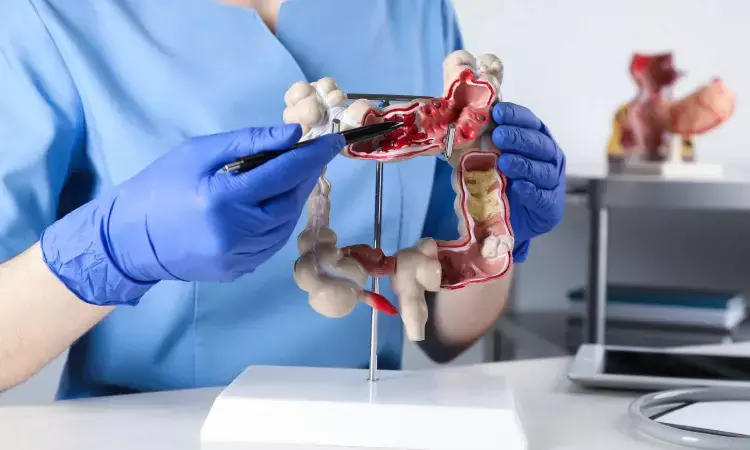- Home
- Medical news & Guidelines
- Anesthesiology
- Cardiology and CTVS
- Critical Care
- Dentistry
- Dermatology
- Diabetes and Endocrinology
- ENT
- Gastroenterology
- Medicine
- Nephrology
- Neurology
- Obstretics-Gynaecology
- Oncology
- Ophthalmology
- Orthopaedics
- Pediatrics-Neonatology
- Psychiatry
- Pulmonology
- Radiology
- Surgery
- Urology
- Laboratory Medicine
- Diet
- Nursing
- Paramedical
- Physiotherapy
- Health news
- Fact Check
- Bone Health Fact Check
- Brain Health Fact Check
- Cancer Related Fact Check
- Child Care Fact Check
- Dental and oral health fact check
- Diabetes and metabolic health fact check
- Diet and Nutrition Fact Check
- Eye and ENT Care Fact Check
- Fitness fact check
- Gut health fact check
- Heart health fact check
- Kidney health fact check
- Medical education fact check
- Men's health fact check
- Respiratory fact check
- Skin and hair care fact check
- Vaccine and Immunization fact check
- Women's health fact check
- AYUSH
- State News
- Andaman and Nicobar Islands
- Andhra Pradesh
- Arunachal Pradesh
- Assam
- Bihar
- Chandigarh
- Chattisgarh
- Dadra and Nagar Haveli
- Daman and Diu
- Delhi
- Goa
- Gujarat
- Haryana
- Himachal Pradesh
- Jammu & Kashmir
- Jharkhand
- Karnataka
- Kerala
- Ladakh
- Lakshadweep
- Madhya Pradesh
- Maharashtra
- Manipur
- Meghalaya
- Mizoram
- Nagaland
- Odisha
- Puducherry
- Punjab
- Rajasthan
- Sikkim
- Tamil Nadu
- Telangana
- Tripura
- Uttar Pradesh
- Uttrakhand
- West Bengal
- Medical Education
- Industry
SPONGE assisted Laparoscopic or robotic surgery of sigmoid colon and rectum fails to reduce hospital stay

Laparoscopic/robotic surgery for sigmoid colon and rectum with sponge assistance does not shorten hospital stays or lower perioperative morbidity or death, says an article published in British Journal of Surgery.
An alternative to the Trendelenburg position in minimally invasive surgery of the sigmoid colon and rectum is the retractor sponge. This randomized clinical study (RCT), carried out by Milad Fahim and colleagues, examined the postoperative duration of hospitalization and perioperative outcomes among patients with sigmoid or rectal cancer who underwent sponge-assisted vs Trendelenburg position surgery.
The SPONGE study is a single-center RCT that adheres to the Trials within Cohorts (TwiCs) design and is nested inside the Dutch countrywide prospective observational cohort of patients with colon cancer. Block randomization was used to randomly assign sigmoid or rectal cancer patients undergoing elective laparoscopic or robotic surgery to either sponge-assisted or Trendelenburg surgery on a 1:1 basis. The Mann-Whitney U test was used to compare the primary outcome, which was the length of postoperative hospital stay. In intention-to-treat and per-protocol analyses, secondary outcomes included the percentage of complications, readmissions, or death compared to the χ2 test.
The key findings of this study were:
1. 81 patients received Trendelenburg surgery and 82 received sponge-assisted surgery between November 2015 and June 2021.
2. 150 patients were left after post-randomization exclusion for analysis (75 patients per arm).
3. There was no statistically significant difference in mortality (0 percent against 1%, P = 1.00), readmission rate (8 percent compared 15 percent), 30-day postoperative complications (30 percent versus 31 percent), or the median length of hospital stay (5 days versus 4 days, respectively).
4. The results of the per-protocol analysis were comparable.
5. There were no unfavorable device occurrences.
Reference:
Fahim, M., Couwenberg, A., Verweij, M. E., Dijksman, L. M., Verkooijen, H. M., & Smits, A. B. (2022). SPONGE-assisted versus Trendelenburg position surgery in laparoscopic sigmoid and rectal cancer surgery (SPONGE trial): randomized clinical trial. In British Journal of Surgery (Vol. 109, Issue 11, pp. 1081–1086). Oxford University Press (OUP). https://doi.org/10.1093/bjs/znac249
Neuroscience Masters graduate
Jacinthlyn Sylvia, a Neuroscience Master's graduate from Chennai has worked extensively in deciphering the neurobiology of cognition and motor control in aging. She also has spread-out exposure to Neurosurgery from her Bachelor’s. She is currently involved in active Neuro-Oncology research. She is an upcoming neuroscientist with a fiery passion for writing. Her news cover at Medical Dialogues feature recent discoveries and updates from the healthcare and biomedical research fields. She can be reached at editorial@medicaldialogues.in
Dr Kamal Kant Kohli-MBBS, DTCD- a chest specialist with more than 30 years of practice and a flair for writing clinical articles, Dr Kamal Kant Kohli joined Medical Dialogues as a Chief Editor of Medical News. Besides writing articles, as an editor, he proofreads and verifies all the medical content published on Medical Dialogues including those coming from journals, studies,medical conferences,guidelines etc. Email: drkohli@medicaldialogues.in. Contact no. 011-43720751


